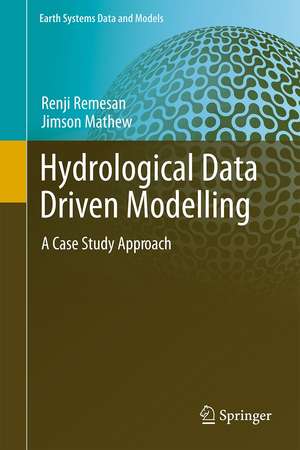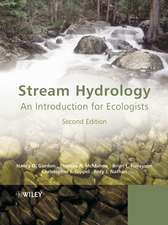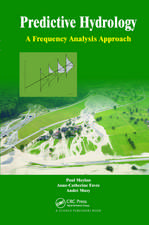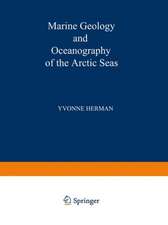Hydrological Data Driven Modelling: A Case Study Approach: Earth Systems Data and Models, cartea 1
Autor Renji Remesan, Jimson Mathewen Limba Engleză Hardback – 17 noi 2014
| Toate formatele și edițiile | Preț | Express |
|---|---|---|
| Paperback (1) | 695.53 lei 6-8 săpt. | |
| Springer International Publishing – 23 aug 2016 | 695.53 lei 6-8 săpt. | |
| Hardback (1) | 731.41 lei 6-8 săpt. | |
| Springer International Publishing – 17 noi 2014 | 731.41 lei 6-8 săpt. |
Preț: 731.41 lei
Preț vechi: 891.96 lei
-18% Nou
Puncte Express: 1097
Preț estimativ în valută:
139.99€ • 145.60$ • 117.31£
139.99€ • 145.60$ • 117.31£
Carte tipărită la comandă
Livrare economică 14-28 martie
Preluare comenzi: 021 569.72.76
Specificații
ISBN-13: 9783319092348
ISBN-10: 3319092340
Pagini: 250
Ilustrații: XV, 250 p. 172 illus., 59 illus. in color.
Dimensiuni: 155 x 235 x 18 mm
Greutate: 0.55 kg
Ediția:2015
Editura: Springer International Publishing
Colecția Springer
Seria Earth Systems Data and Models
Locul publicării:Cham, Switzerland
ISBN-10: 3319092340
Pagini: 250
Ilustrații: XV, 250 p. 172 illus., 59 illus. in color.
Dimensiuni: 155 x 235 x 18 mm
Greutate: 0.55 kg
Ediția:2015
Editura: Springer International Publishing
Colecția Springer
Seria Earth Systems Data and Models
Locul publicării:Cham, Switzerland
Public țintă
ResearchCuprins
Introduction.- Hydroinformatics and Data based Modelling Issues in Hydrology.- Hydroinformatics and Data based Modelling Issues in Hydrology.- Model Data Selection and Data Pre-processing Approaches.- Machine Learning and Artificial Intelligence Based Approaches.- Data based Solar Radiation Modelling.- Data based Rainfall-Runoff Modelling.- Data based Evapotranspiration Modelling.- Application of Statistical Blockade in Hydrology.
Notă biografică
Dr Renji Remesan is a research fellow in Cranfield Water Science Institute at Cranfield University in United Kingdom. Dr Remesan’s research interests include non-linear modelling of hydro-metrological time series, artificial intelligence in hydrology, numerical weather modelling and river basin/catchment modelling using physically/ conceptual lumped models and distributed hydrological models. He is an Associate Fellow of the UK Higher Education Academy and editorial member of the Journal of Earth science and Climate change. He holds a PhD from the University of Bristol and an M.Tech from the Indian Institute of Technology, Kharagpur.
Dr Jimson Mathew received a PhD in Computer Science from University of Bristol, UK. He has held positions with the Centre for Wireless Communications, National University of Singapore, Bell Laboratories Research (Lucent Technologies) North Ryde, Australia and Royal Institute of Technology (KTH), Stockholm, Sweden. Since 2005, he has been with the Department of Computer Science, University of Bristol, UK. His research interest primarily focuses on Fault-tolerant Computing.
Dr Jimson Mathew received a PhD in Computer Science from University of Bristol, UK. He has held positions with the Centre for Wireless Communications, National University of Singapore, Bell Laboratories Research (Lucent Technologies) North Ryde, Australia and Royal Institute of Technology (KTH), Stockholm, Sweden. Since 2005, he has been with the Department of Computer Science, University of Bristol, UK. His research interest primarily focuses on Fault-tolerant Computing.
Textul de pe ultima copertă
This book explores a new realm in data-based modeling with applications to hydrology. Pursuing a case study approach, it presents a rigorous evaluation of state-of-the-art input selection methods on the basis of detailed and comprehensive experimentation and comparative studies that employ emerging hybrid techniques for modeling and analysis. Advanced computing offers a range of new options for hydrologic modeling with the help of mathematical and data-based approaches like wavelets, neural networks, fuzzy logic, and support vector machines. Recently machine learning/artificial intelligence techniques have come to be used for time series modeling. However, though initial studies have shown this approach to be effective, there are still concerns about their accuracy and ability to make predictions on a selected input space.
Caracteristici
Covers many aspects of data based modelling issues with application to Hydrology Brings readers up to date with clear case studies Enables engineers to appropriately identify modelling approaches and issues Includes supplementary material: sn.pub/extras












